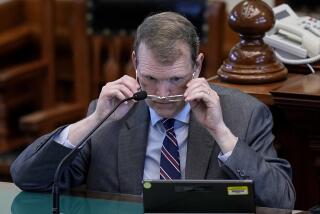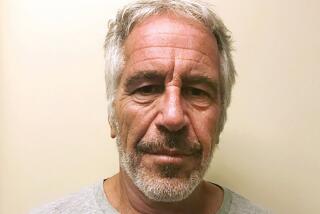Good Riddance
- Share via
Atty. Gen. Edwin Meese III purports to find vindication in the findings of independent counsel James C. McKay, but we can’t imagine where. What we find, as we study the 814-page report released Monday, is a dossier of chiseling, cronyism and conflict of interest whose disclosure would embarrass almost anyone who cared one whit about professional ethics or the standing of the Justice Department. Anyone except Ed Meese.
Most Americans, for example, would have trouble sleeping if they had failed to report $20,000 in income to the Internal Revenue Service. But, as McKay’s report reveals, Meese couldn’t put his hands on the right documents when his 1985 tax return was due, so he neglected to report $20,706 in capital gains from the sale of stocks. Only when his accountants were summoned before a grand jury in February of this year did Meese file an amended return and pay the government what was due two years earlier. McKay decided that a jury would probably convict Meese for filing a “materially false tax return,” but he declined to prosecute partly because the attorney general had paid up.
On paper, it would also appear that Meese violated a federal conflict-of-interest law by participating in the breakup of AT&T; while owning $14,000 in regional telephone company stock. The independent counsel, showing Meese every benefit of the doubt, decided not to prosecute because Meese, while working at the White House in the early 1980s, got special permission to work on AT&T; matters despite his stockholdings and again in 1987 sought another waiver. The intervening years were not covered by waivers, but McKay chose to ignore what would have been a very technical infraction.
McKay’s investigation of Meese’s involvement in the proposed construction of a $1-billion Iraqi oil pipeline, the central issue in the case, was hampered by uncooperative witnesses, especially E. Robert Wallach. As McKay reported, Meese “undertook unusual activities” for Wallach, his longtime friend and lawyer. Meese asked then-National Security Adviser Robert C. McFarlane to meet with Wallach, who had been retained by a Swiss-based businessman to help with the project. At the very same time, Wallach was performing all sorts of favors for Meese--helping him refinance his house and finding his wife a job. McKay noted “the coincidence . . . between Mr. Meese’s acceptance of things of value from Mr. Wallach and Mr. Meese’s official acts that benefited Mr. Wallach.” But after Wallach invoked his Fifth Amendment privilege against self-incrimination and declined to testify, McKay concluded that there was not enough evidence to prove that Meese knew that Wallach expected favors in return. In essence, McKay couldn’t prove Meese’s criminal intent.
No matter how loudly Meese protests his innocence or denounces McKay’s probe as a waste of money, the facts that the prosecutor has laid out belie his claims. On this record the Justice Department’s Office of Professional Responsibility would be justified in recommending Meese’s censure; we can’t think of a better send-off as the attorney general returns to private life next month. Meese escaped prosecution only because the prosecutor was not certain that he could prove him guilty on the major counts and considered it unwise to pursue the minor ones alone. Good prosecutors make just these kinds of decisions all the time. The ultimate irony in this case is that Meese, a bad prosecutor who disgraced the Justice Department, should be spared by a good prosecutor.
More to Read
Get the L.A. Times Politics newsletter
Deeply reported insights into legislation, politics and policy from Sacramento, Washington and beyond. In your inbox twice per week.
You may occasionally receive promotional content from the Los Angeles Times.










